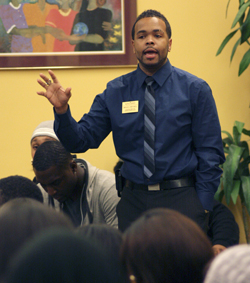BUS looks for members at emergency meeting

Bruce Mitchell, assistant director of Upward Bound Classic, addresses the crowd at the emergency Black United Students meeting held in the Multicultural Center Tuesday. Mitchell asked, “What legacy will you leave behind?” Photo by Valerie Brown.
April 6, 2011
Black United Students is still on campus.
Contrary to posters suggesting the oldest student group on campus might not see another semester, BUS programmer Danea Rhodes assured members in an emergency mass meeting Tuesday, “as of right now, BUS is still here.”
Secretary Jamilia Bush said the organization’s advertising tactic was a matter of sparking interest in running for executive board positions.
“When everyone has something gossipy to talk about, they always want to know what it is,” Bush said. “So we kind of said it as gossip, but it was really something that we really cared about as far as, you know, continuing our organization and making it effective.”
She said there were no other reasons for holding the meeting.
Tristian Holmes, former Kent African Student Association president from 2008 to 2010, said he feels the purpose of the meeting was “to raise awareness that one of the long standing minority organizations on campus risks not existing anymore.”
He said the risk can be mainly attributed to general apathy. However, another reason “could be personal issues that people may have with past BUS (executive) board members,” Holmes said.
“In the time I’ve been here as a student leader, as a president, I’ve seen that some organizations have a certain arrogance about themselves, that they feel like they can just program over other organizations instead of just working with them, or supporting other organizations,” Holmes said.
He said there were “most definitely” issues of groups not working together when he served as KASA president.
“I feel that if they truly realize that it’s not just about them, but there’s other student leaders on this campus serving a purpose also with them, then they’ll be more inclined to support and co-sponsor the other student leaders too,” Holmes said.
Bush said there aren’t such issues between the groups.
“There are no tensions. At all. None. No tensions. Zero. Cero. I don’t even know any other words, but there are zero tensions between any other groups.”
Holmes said he thinks the meeting helped resolve some issues, especially in respect to potential executive board applicants for next year.
Bush said prior to the meeting, there were no applications for students to be on the BUS executive board.
The meeting produced a list of “about 20” people interested in a position, Rhodes said.
Rhodes urged members at the opening of the meeting to step up and lead the organization into the future.
“If no one runs on the board when we leave, then how will the organization be able to run the next semester and plan events like Black History Month next semester?” Rhodes said.
During the meeting, Rhodes and other executive board members took questions and comments from members about concerns, from knowing exactly what BUS does to cooperate with other student organizations.
Traci Williams is a lecturer in the school of Journalism and Mass Communication and Pan-African Studies and was BUS President from 1998 to 1999. She said although the cause of the meeting wasn’t officially stated to her, she had an idea it was the lack of participation.
“Because of my involvement in BUS,” Williams said. “I knew something wasn’t right.”
She said the events receive so much promoting on social media sites like Facebook and Twitter — mediums of communication she never had as president — that there is “really no excuse for students not to be at events.”
During the meeting, she said when she was affiliated with BUS, there weren’t any problems of organizations working together and these issues are new.
“There is not that many black students on this campus,” Williams said. “There is no reason you should not be working together and having fun.”
However, Williams said she believes BUS will get it together.
“BUS is going to be here; it stands the test of time,” Williams said. “There’s a lot of support from Pan-African Studies and the Division of Diversity, Equity and Inclusion. They have our support. I think the students get it.”
Bush said she wants to set the stage for people to come after her.
“I want 40 years of history to live on,” she said.
Contact Daniel Moore at [email protected]
























